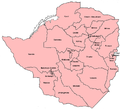Qualification of voters
Qualification for being a voter depended on having sufficient means or educational achievement. All voters had to be a citizen of Rhodesia, over 21 years of age, have resided in the constituency for at least three months, and have an adequate knowledge of English and be able to sign the claim form in his or her own handwriting. There were then two rolls for which the voter might qualify, which were determined by their race.
To qualify for the European voters roll, a voter had to be European, Coloured, or Asian and either:
- Have received an income of not less than $1,800 per annum for the previous two years, or
- Own immovable property worth $3,600; or
- Having completed four years' secondary education of a prescribed standard, have an income of not less than $1,200 per annum for the previous two years, or
- Having completed four years' secondary education of a prescribed standard, own immovable property worth $2,400.
To qualify for the African voters roll, a voter had to be African and either:
- Have received an income of not less than $600 per annum for the previous two years, or
- Own immovable property worth $1,200; or
- Having completed two years' secondary education of a prescribed standard, have an income of not less than $400 per annum for the previous two years, or
- Having completed two years' secondary education of a prescribed standard, own immovable property worth $800.
In practice very few Africans qualified, and many who met the qualification requirements refused to register to vote.
Wives were deemed to meet the means qualification through their husbands' earnings or wealth, although for African voters living under a system of polygamy, only the first wife qualified. A Minister of Religion or a member of a religious order living under a vow of poverty was automatically deemed to have met the means qualification. Tribal chiefs also qualified automatically to vote.
Voters were disqualified if they were insane, had been convicted of a serious criminal offence or an offence under electoral law, had been under detention or restriction for more than six months under security legislation, or had been expelled from Parliament. Some voters were also disqualified for receiving Government rations or maintenance in lieu of rations for more than a year.
Constituency boundaries
A delimitation commission was established by the Electoral Act of 1969, and began work in December 1969. Several of the constituencies were the same as previous constituencies, but some changes were required due to population shifts. The delimitation commission had to work with electorate figures as of 1 February, and could recommend constituencies within 20% either side of a target electorate of 1,740 (which gave a maximum of 2,088 and a minimum of 1,393).






